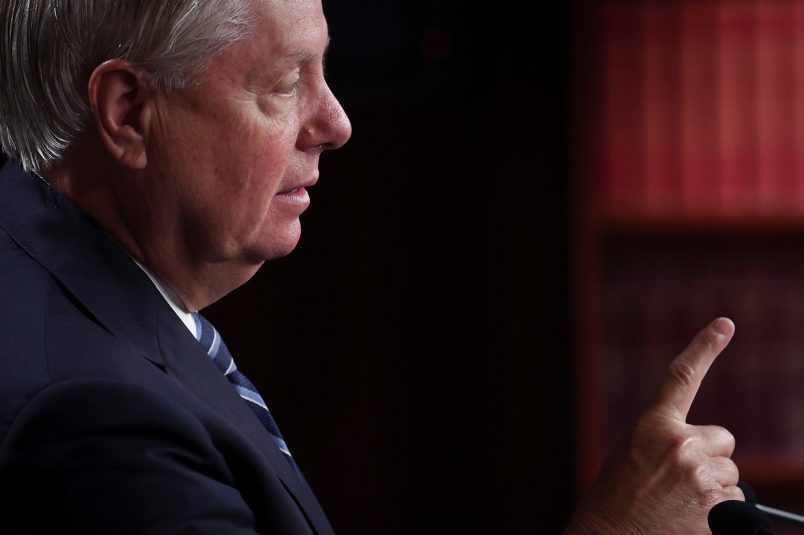After months of fighting it in court, Sen. Lindsey Graham (R-SC) is set to testify on Thursday in the Georgia state investigation of Donald Trump’s interference in the 2020 election.
Here’s a preview of how Graham was involved in Trump’s attempt to subvert the 2020 election in Georgia, what prosecutors have suggested they’re interested in from him, and where he might be able to avoid questioning.
Graham was deeply involved in the Big Lie in Georgia
Starting days after the 2020 election, Graham began to reach out to Georgia state officials.
It came as Trump was starting to pressure officials both in his administration and in states that he had lost to pull out all the stops they could to turn the election to him.
Much of that relied on attempts to discredit — either by myths about rampant voter fraud or legal challenges to already-approved voting processes — the result. If Trump’s plan worked, state officials would agree to throw out enough votes to flip the results to him. Alternatively, enough doubt would be cast on the results for judges or state legislatures to find a way to swing the result away from Biden.
Here’s where Graham reportedly came in.
On Nov. 13, the week after the election was called, he reportedly made two phone calls to Georgia Secretary of State Brad Raffensperger (R).
Raffensperger told the Washington Post at the time that Graham hinted that the state should toss legally cast votes to give Trump a victory in the state.
“It sure looked like he was wanting to go down that road,” Raffensperger told the paper. Gabe Sterling, another Georgia elections official, was also on the call, and reportedly confirmed that the two discussed whether “whole counties” could have their votes tossed.
Graham kept up pressure on the public side, demanding that Raffensperger conduct a post-certification audit in December 2020 “while there is still time.”
After the infamous Jan. 2 phone call between Trump and the Georgia secretary of state, where the former president asked him to “find me votes,” one Raffensperger staffer remarked that he recorded the call because of his brush with Graham.
“This is a man who has a history of reinventing history as it occurs,” a Raffensperger adviser told Politico Playbook on Jan. 4, 2021, referring to Trump. “Lindsey Graham asked us to throw out legally cast ballots. So yeah, after that call, we decided maybe we should do this.”
Graham really didn’t want to testify
Graham received a subpoena on July 6 from a Fulton County grand jury as part of District Attorney Fani Willis’ investigation into Trump’s efforts to subvert the election result.
The same day, other MAGA notables received subpoenas from the state grand jury, including Trump adviser Rudy Giuliani and attorney Kenneth Chesebro.
Almost immediately, Graham challenged the subpoena in court.
On July 12, he sued to block the subpoena, claiming that he was immune from testimony under the Constitution’s Speech and Debate Clause because he was fulfilling his duties as a senator while reportedly pressing state officials to cancel votes that didn’t go Trump’s way.
It morphed into a months-long court battle, one that didn’t end until Graham took it all the way to the Supreme Court last month.
On Nov. 1, the high court ordered Graham to testify by Nov. 17.
He’s left with one get out of jail free card, so to speak: senatorial privilege. Per an earlier district court ruling that the Supreme Court upheld, Graham can decline to answer questions about his “fact-finding” efforts around the election.
Prosecutors have shown what they want
Prosecutors have offered suggestions about what they want from Graham on Thursday.
It mainly concerns two areas: Graham’s calls to Raffensperger in November 2020, and his public allegations about supposed voter fraud that changed the election outcome in Georgia.
In the subpoena application, prosecutors referred to “at least two telephone calls” that Graham made to Raffensperger and his staff members after the 2020 election.
“During the telephone calls, the Witness questioned Secretary Raffensperger and his staff about reexamining certain absentee ballots cast in Georgia in order to explore the possibility of a more favorable outcome for former President Donald Trump,” the subpoena application approval reads.
Prosecutors also referenced Graham’s “allegations of widespread voter fraud in the November 2020 election in Georgia, consistent with public statements made by known affiliates of the Trump Campaign.”
The court said that it approved the subpoena on the basis of the “substance and timing of the telephone call” to Raffensperger, finding that it made Graham “a necessary and material witness in this investigation.”
The question there, the document reads, doesn’t only go to Graham himself and what he said, but to whether anyone directed him to ask Raffensperger to throw out the votes, as well as the “circumstances surrounding his decision to make the telephone calls” and the nature of ” any communications between himself, others involved in the planning and execution of the telephone calls, the Trump. Campaign” and others.
Take a look at the subpoena approval here:






